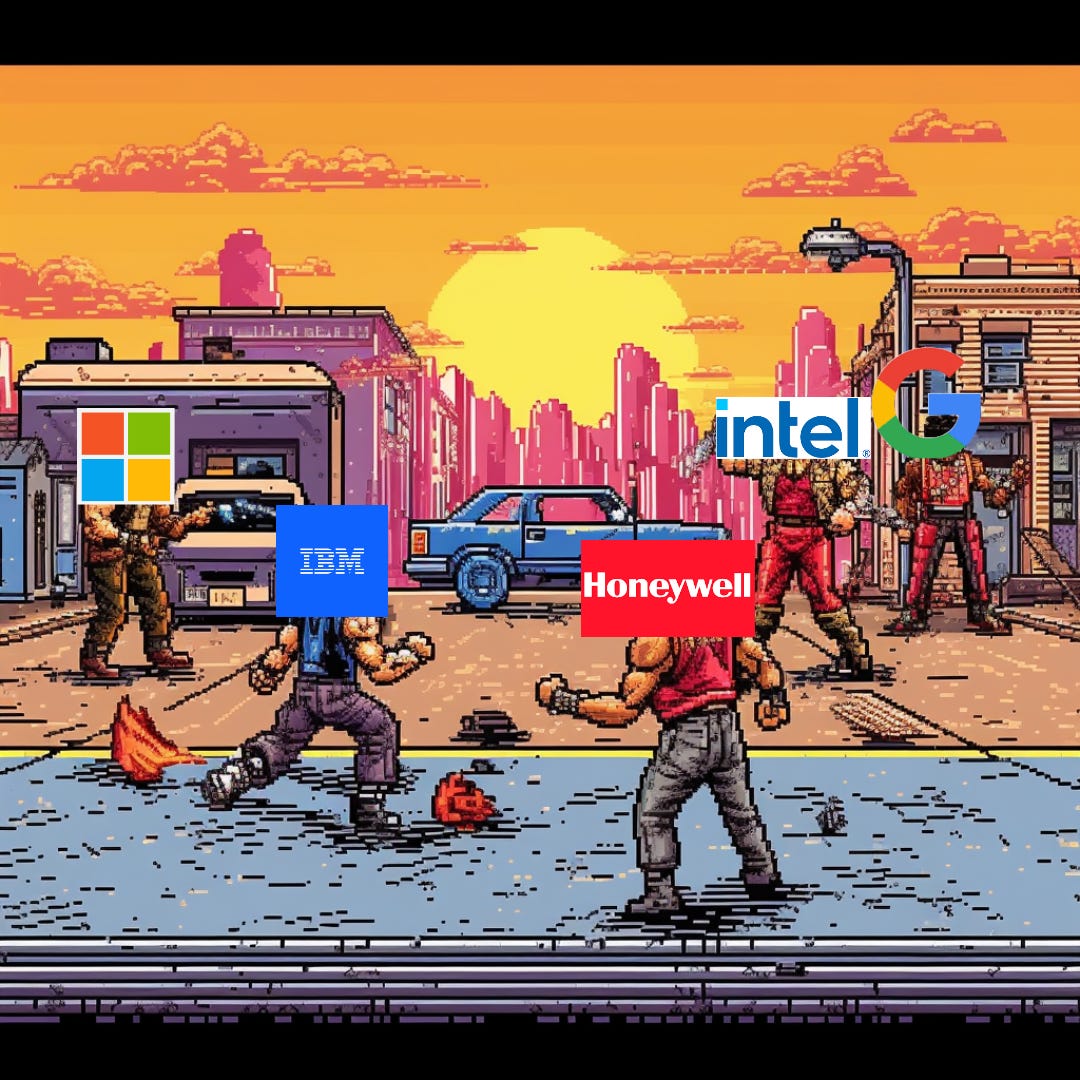Master the Quantum Leap: Your Comprehensive Guide to Quantum Computing
Ready for a paradigm shift in technology? Unravel the mysteries and opportunities of Quantum Computing and stay ahead of the curve.

What was once science fiction is quickly becoming science fact (or very close to becoming reality). This promises to be the next big thing in the computing world - Quantum Computing! Think of it as the Wild West of computing, a magical land where subatomic particles dance the cha-cha and laws of physics become more guidelines than actual rules. Like a movie with a plot twist you didn't see coming, quantum computing promises to turn our understanding of computing on its head. What were once the limits of computation are now just the starting line. I mean, when you've got tiny particles strutting their stuff and being in two places at once, it kind of makes your home computer seem a bit, well, pedestrian, doesn't it?
I’ve been hearing about Quantum Computing for awhile now, and didn’t really understand it. The only thing I took from it was that all our passwords would become obsolete overnight. However thanks to Michio Kaku going on the podcast circuit this past month, and my colleague Octavia peaking my interest on the topic, I had to take a deeper look.
Let's get straight to it. What on earth is this quantum thingamajig, you ask? No, it’s not a new James Bond villain, though I'm sure it would make a fascinating one. There are two main concepts to help you wrap you head around this concept.
Superposition &,
Entanglement (no this isn’t a Will Smith joke)
Before we jump to quantum computing, lets first compare and understand the difference from today’s classical computing. Classical computing resembles a coin toss, switching between heads and tails, or 1s and 0s. Now let’s talk quantum. Quantum computing operates on different premise. Envision a magical coin that is concurrently in a state of heads and tails until observed - a concept in quantum mechanics known as 'superposition'.
But the uniqueness of quantum computing doesn't end there. Another key principle is 'entanglement', a phenomenon akin to two intimately connected particles that reflect each other's states across vast cosmic distances. Thus, while classical computing operates in a straightforward binary manner, quantum computing introduces a level of complexity unseen in classical systems.
The functioning units of quantum computers are 'qubits', which have the remarkable ability to exist in a state of 0 and 1 concurrently. Additionally, through 'quantum entanglement', pairs of qubits can maintain their correlation irrespective of the distance separating them - like a pair of synchronized dancers performing in perfect harmony, even if they were on opposite ends of the planet. This may appear to be an exaggeration, but it accurately reflects the awe-inspiring capabilities of quantum computing.
As we look toward this bright, shiny, quantum future, let's spare a moment for our trusty classical computers. They’ve been our loyal companions for decades, helping us connect, discover, create, and let's be honest, waste ridiculous amounts of time scrolling through dog memes. They might not have the quantum 'oomph', but hey, they've got us this far, and that's pretty darn impressive.
Now, let's talk benefits, my friends! Quantum computers promise to do calculations faster than a cheetah on a caffeine rush. Imagine solving problems in seconds that would take a classical computer longer than the age of the universe! And then there's the encryption game. Thanks to our quantum friends, we'll have codes harder to crack than deciphering your cat's mood swings.
Are there risks? You bet. Just like that spicy taco that promises flavor heaven but might just leave you clutching your stomach, the quantum future is tantalizing, but uncertain. But isn't that the beauty of it? The thrill of the unknown, the excitement of risk – that's what pushes us forward, keeps us innovating, and makes the journey worth it. We do have a few issues to iron out. You see, while quantum computers could create encryption that's tough as old boots, they could also break existing encryption faster than a toddler dismantling a Lego castle. Yes, it’s a double-edged sword, folks. Suddenly, all your secret online recipes and saved episodes of "Desperate Houseplants" might be up for grabs.
Furthermore, while we're all salivating at the potential speed of quantum computers, there are worries they might make our current systems look like plodding snails, leading to quantum supremacy. It's like using your toddler’s toy computers at work; things are likely to get disrupted.
Industries in the Quantum Crosshairs: How Quantum Computing Will Shake Things Up
Quantum computing, a nascent yet highly transformative field, is anticipated to bring significant advancements across various industries. As the technology continues to mature, the profound implications of its vast computational power will become increasingly apparent. We're set to see every industry transformed by this radical technology. You thought online shopping was convenient? Wait till you see the potential when quantum algorithms get involved. You'll have the perfect pair of shoes before you even realize you need them. Now, who's going to feel the impact of these quantum bad boys? Pretty much everyone, but there are a few front runners.
First, there's Big Pharma and the healthcare game. Quantum computers are like the ultimate mixologists, simulating how molecules get along with each other with a finesse that's just off the charts. This could help us whip up new drugs and know how they'll behave before they even hit clinical trials. Plus, they could totally shake up personalized medicine, sifting through mountains of genetic data to cook up treatments that are tailor-made for you.
Next, we got the moneymakers in financial services. Quantum computing could totally pimp out trading strategies, managing portfolios, analyzing risk, and sniffing out fraud. It can crunch crazy complex algorithms for pricing options, managing assets, and predicting when the market's gonna throw a wobbly - all stuff that would have a classical computer working overtime.
Then there's logistics and supply chain management. Quantum computing could make a real splash in sorting out gnarly logistical problems like plotting the best routes, managing inventory, and forecasting demand. It could even help create leaner, greener supply chains by juggling loads of variables and constraints at once.
Don't forget about energy. The energy biz could get a real shot in the arm from quantum computing, especially when it comes to material science. Quantum simulations could speed up finding and developing new materials that are energy-efficient, better battery tech, and slicker ways to capture and store energy.
Cybersecurity is a tricky one. On one hand, quantum computing could crack traditional encryption algorithms like a nut, which is a big old security worry. But on the flip side, quantum encryption techniques, like Quantum Key Distribution (QKD), could usher in a new age of secure communication that's tighter than a drum.
Artificial Intelligence and Machine Learning could also get a boost. Quantum computing could seriously turbocharge machine learning algorithms and AI systems. It's got the chops to handle massive amounts of data, solve complex optimization problems, and improve pattern recognition, which could put the pedal to the metal for AI evolution.
Lastly, we've got climate modeling and environmental science. Quantum computers could whip up super accurate climate models by handling the mind-boggling complexity of Earth's climate systems. This could really move the needle on understanding climate change and developing strategies to tackle it.
Quantum computing is like your slightly crazy, eccentric uncle. It’s fascinating, potentially brilliant, and could revolutionize your life (or at least your Sudoku solving time). But, there are quirks and kinks to work out. While it might unceremoniously kick classical computing off the top spot, it might also break a few things in the process. However, isn’t that part of any great adventure?
Quantum Titans: The Trailblazing Powerhouses Shaping the Future of Quantum Computing
It's time to meet the movers and shakers in the wild world of quantum computing. There are a bunch of top dogs making waves, both in the biz and the ivory tower.
We've got the Big Blue itself, IBM. These guys have been in the quantum game for years, offering quantum computing services via the cloud through IBM Quantum Experience. They've got their mitts in all sorts of quantum pies, developing new hardware and software left, right, and center.
Next, we've got Google. These folks aren't just about search engines and email, no siree. Google's Quantum AI team is kicking quantum goals, even claiming "quantum supremacy" back in 2019. That basically means they reckon their quantum computer could solve a problem faster than a classical computer could. Big call, Google.
Then we've got Microsoft, dipping their toes in the quantum pool. They're all about making quantum computing more accessible, with their Quantum Development Kit and the Q# programming language. Nifty, right?
Don't forget D-Wave Systems. This Canadian crew is all in on quantum annealing, a specific flavor of quantum computing. They've been flogging quantum computers since 2011, so they've got some serious skin in the game.
Intel is next, straddling two quantum horses. They're dabbling in silicon-based quantum computing and something called spin qubits, which are tinier than the superconducting qubits that IBM and Google play with.
Rigetti Computing, a spry startup, is in the mix, designing and making superconducting quantum integrated circuits. They're also whipping up software to make quantum computing work with existing cloud infrastructure.
Let's jet over to China, where Alibaba is flexing their quantum muscles. They've got their own Quantum Computing Laboratory and even offer quantum computing services through the cloud.
IonQ is another eager beaver startup using trapped ion tech for their quantum computers. In 2020, they pushed their quantum computers out into the cloud.
Last but not least, we've got Honeywell. They've launched their quantum computer that, at the time, was outperforming all the rest in quantum volume, a fancy way of saying quantum capability.
And that's just the industry side. Universities and government labs all over the world, like MIT, Caltech, and the University of Waterloo's Perimeter Institute, are up to their elbows in quantum computing research. It's a bustling, exciting field, with fresh faces popping up all the time. Keep your eyes peeled, because the quantum landscape is changing faster than you can say "superposition".
The Quantum Conundrum: Navigating the Challenges in Quantum Computing

Venturing into the realm of quantum computing is akin to stepping into a science fiction novel. It's enticing, fascinating, and admittedly a tad bit intimidating, kind of like the time I tried to assemble IKEA furniture without the instructions. There are mind-boggling aspects to comprehend, and as thrilling as the journey is, there are several hefty challenges to overcome:
The Qubit Quandary: Quality and Quantity
First off, we've got the issue of qubits, which are the quantum equivalent of the bits in your everyday computer. The problem is, these little rascals are about as stable as a house of cards in a windstorm. This issue, called "decoherence," is all about maintaining the qubits in their special quantum state, a task more delicate than carrying a dozen eggs in a paper bag.
Next, there's the question of numbers. Sure, one qubit is cool, but quantum algorithms start to show their magic when you've got a bunch of qubits working together. It's like being at a party - the more the merrier. But ramping up the qubit count while keeping them all coherent? Now, that's a serious challenge!
Error Correction and Hardware Hassles
Remember when I mentioned the fragility of qubits? Well, this leads to another hurdle: error correction. Qubits are prone to mistakes, and while we have ways to rectify them, these methods often require even more qubits. It’s a bit like a self-fulfilling prophecy of complexity!
The hardware for quantum computers also presents its own bag of worms. These devices need the kind of cold that would make a polar bear shiver, which means designing and maintaining them is no walk in the park.
Software Struggles and Interpretation Issues
Writing software for quantum computers is like composing a symphony for instruments that haven't been invented yet. It's a completely different ball game from classical computing, and we're still figuring out the rules.
Moreover, understanding the results from a quantum computation can be just as tricky as a cryptic crossword puzzle. You can't always check the solution as you would with a classical computer, which definitely adds to the fun.
Encryption Threat and Workforce Woes
Quantum computers could potentially crack current encryption methods like a nut, leading to some serious cybersecurity headaches. It's a bit of a double-edged sword - while it's exciting to think about quantum-resistant encryption, the potential disruption is also a significant barrier.
Finally, we arrive at the human element - the workforce. Quantum computing is a heady mix of quantum physics and computer science, and finding folks who can straddle these two worlds is a tall order.
Each of these challenges presents a fascinating puzzle to solve in the quest for practical quantum computing. We've come a long way, but there's still an exciting journey ahead. So, buckle up and join us as we navigate this quantum conundrum!
Conclusion
So, as we stand at the starting line of this new era, remember to pack a healthy dose of curiosity, a pinch of caution. Strap on your proton packs and charge up your qubits, ladies and gentlemen. The quantum future is coming, and it's set to be a wild ride! Remember, in the quantum realm, the impossible is just another day. quantum computing, while still in its early stages, is expected to bring a paradigm shift across industries, unlocking new opportunities and challenges alike. As such, understanding and preparing for the potential impact of this technological revolution is crucial for both industries and society as a whole.
Here's to our quantum future - unpredictable, full of promise, and sure to be one heck of an adventure. It's like nothing we've ever seen before, and that's precisely what makes it so exciting. So, let's step into tomorrow, quantum-style! And remember, in the rollercoaster ride of quantum computing, it's not just about the destination; it's about the crazy, mind-bending journey. And who knows? With a bit of quantum magic, we might just end up where we started and somewhere entirely new, all at the same time.
So, as we usher in the era of quantum computing, let's bring our biggest dreams, our boldest ideas, and our bravest hearts. And don't forget a dose of patience because, let's face it, no one becomes a quantum whizz overnight. Quantum on, folks!


